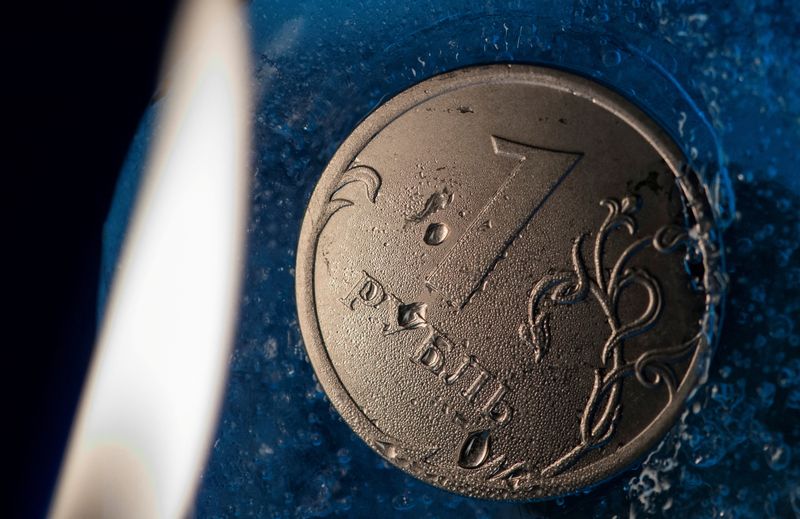MOSCOW (Reuters) -New U.S. sanctions that forced Russia's leading exchange to halt dollar and euro trading led to a range of varying prices and spreads as trading moved over-the-counter (OTC) on Thursday, obscuring access to reliable pricing for the Russian currency.
The Russian central bank set its official rouble-dollar rate for Friday at 88.21, implying a strengthening of about 0.9% from the previous close. But the sanctions caused confusion in how to determine accurately the currency's exact value.
On the interbank market, the rouble traded between a 10-day low of 90.25 and a near one-year high of 86.28, eventually settling 0.4% higher at 88.62.
The central bank calculated its official rate based on OTC trading, instead of its previous method of mostly using trades on Moscow Exchange, Russia's leading financial market place.
Washington's sanctions on MOEX, and crucially its clearing agent, the National Clearing Centre (NCC), have been expected since Russia's full-scale invasion of Ukraine in February 2022, but the move still took the market by surprise.
The sanctions led to a suspension of trading in U.S. dollars, euros and Hong Kong dollars on MOEX. The U.S. said it was aiming to cut the flow of money and goods used to sustain Russia's war in Ukraine.
MOEX is part of Russia's critical financial infrastructure, but the latest sanctions are seen having limited impact on Russia's ability to continue selling its oil and gas internationally as Moscow has already diverted much of its trade flows towards China and other Asian countries.
"Over the past two years, the role of the US dollar and the euro in the Russian market has been consistently declining," the central bank said on Thursday.
The yuan has surpassed the dollar to become the most traded currency with the rouble in Moscow, accounting for a 54% share of the FX market in May.
The rouble steadied at 12.22 against the yuan and touched a near one-year high of 11.8430 earlier in the session.
Russia's rouble-based MOEX Russian index plunged to a near six-month low in early trading, before paring losses to close unchanged at 3,171.7 points. Shares in MOEX slumped around 15%, before settling around 3.1% lower.
VOLATILITY, WIDE SPREADS
"The sanctions against the key institutions of the Russian financial sector are the most serious in the last 1-1/2 years after the introduction of the oil embargo and oil price cap," said BCS World of Investments analysts.
About 60% of FX trading from January to April had been on the OTC market, BCS said, so it offers a sufficient basis for forming the official exchange rate.
"At the same time, the lack of a single trading floor will lead to an increase in spreads on FX operations from banks."
Banks, companies and investors are no longer able to trade either the U.S. dollar or the euro via the central exchange, which provides benefits such as liquidity, clearing and oversight.
Instead, the opaque OTC market, where deals are conducted directly between two parties, will dominate.
"The new sanctions should not affect the rouble rate in the medium term," said Yuri Popov, SberCIB Investment Research strategist. "In the short term, there may be high volatility and wide spreads at exchange counters."

Some major brokers blocked accounts in dollars, euros and Hong Kong dollars, with deposits and withdrawals unavailable.
Sberbank, Russia's dominant lender, said it was not seeing increased demand for foreign currency at its branches and its FX rates had not changed since yesterday.